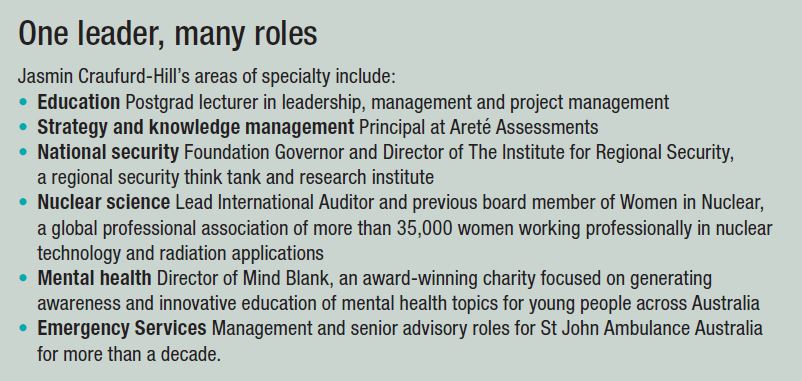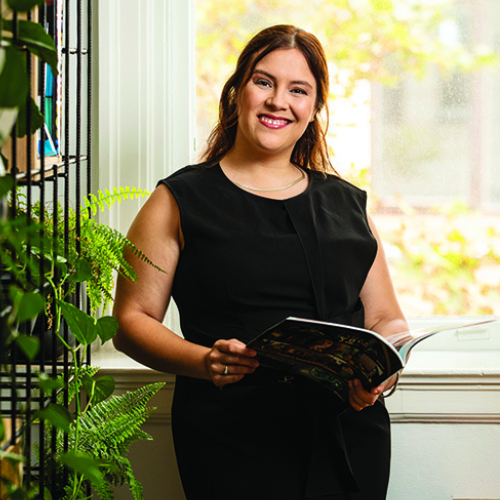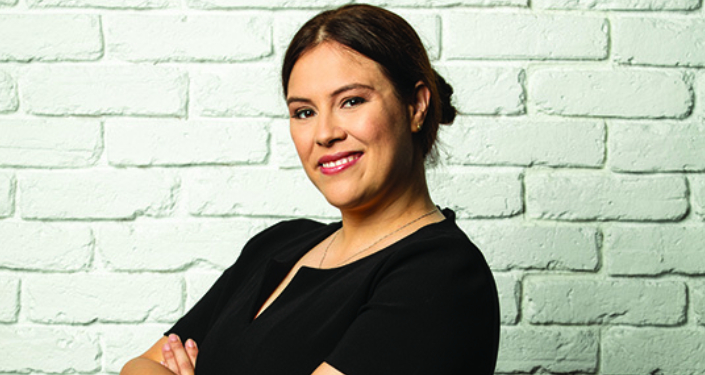Director. Consultant. Scientist. Researcher. Volunteer. Educator. Jasmin Craufurd-Hill FIML is a leader who wears many hats. Across all her roles, she applies the same clear-eyed focus on the big picture.
As principal of Areté Assessments, she advises a range of organisations on knowledge management and strategy issues. As a nuclear safety professional, she has helped enhance international collaboration, security and diversity. And her long association with St John Ambulance has helped ensure high-quality health services are delivered to people in their most desperate hour.
IML ANZ chief executive David Pich CMgr FIML caught up with Craufurd-Hill for a wide-ranging discussion about leadership.
David Pich:
As a St John Ambulance volunteer, you were deployed to the South Coast of New South Wales during the recent bushfires. What did you see on the ground there?
Jasmin Craufurd-Hill:
I was there with my team looking after 3,500 evacuees alongside other agencies and voluntary organisations. I’d also previously staffed the Public Information and Inquiry Line.
The devastation across the South Coast and Batemans Bay area was heartbreaking to witness. Stories were coming in of people fighting for their homes and their lives. Tragically, some people lost those fights. At one point in January the area was ringed by fire-fronts and communication lines went down for a while, leaving the community isolated and afraid. People were stretched emotionally, psychologically, physically and financially.
And yet, in that dark, desperate time, something remarkable happened. Everyone looked out for each other. People shared their food. Children shared their toys. People even helped care for one another’s pets. There were 3,500 people in a very small space. Tempers could have frayed but instead the community just rose to the challenge together.
DP: Stories of hope and perseverance got a little drowned out in the media coverage of the bushfires. But those small acts of humanity can make such a big difference, can’t they.
JCH: They really can. I met a science teacher who had lost 1,500 books, acquired over his lifetime. Books that he used to mentor his students. I was able to spend time with him and talk about science. A few days later, I saw him and he said, ‘That chat helped me keep going and see a way forward’. So I said, ‘Well can I give you some books? Can I put together a collection?’ Just something as simple as that can mean the world when everything else has been lost.
DP: Do you think your voluntary work has helped you professionally?
JCH: Without a doubt. The leadership skills you develop through your lifetime aren’t just developed in the workplace. You pick them up in everything you do. I think the barriers between home life, community life and work life have come down now – in a positive way.

DP: I’ve certainly noticed that as President of the Parents & Citizens Association at my children’s school. I sometimes sit there and think, ‘Everything I’m learning here is so applicable to my job. I might be talking with kids or teachers or parents but it’s basically still management and leadership’.
JCH: Yes, and as leaders we don’t just have a responsibility to bring our ‘whole selves’ to work. We also have a responsibility to see other people that way too. For example, a parent who has taken time off work to raise a family can offer an employer a whole range of transferable skills: Problem solving. Time management. Budget supervision. Even conflict resolution! The same goes for the many thousands of people with other caring responsibilities outside of work. No human being is one dimensional. We each play many roles in our lives. The best managers and leaders recognise that, see people’s potential and empower them to express their talents.
DP: Changing tack now, you first worked in the nuclear industry in 2002 and you’ve continued to be involved, in various roles, ever since. What first led you to work in that area?
JCH: My background is physics but I became a nuclear scientist almost by accident. I did an internship and then, like so many women before and after me, my career moved diagonally. I accepted a series of interesting job offers and eventually became the first Australian woman to both commission and operate a nuclear facility. I remained in the nuclear sector for a decade and a half, not just in operations but in research too.
DP: The science and engineering fields are typically dominated by men. Was that the same in the nuclear sector?
JCH: Traditionally it was but that’s changing. Nuclear technology is genuinely cutting edge and it constantly requires new solutions and fresh perspectives. For that reason, diversity of thought isn’t just a ‘tick the box’ issue. Employers now realise their organisations will be stronger with a diverse workforce.
DP: Australia’s energy future is a divisive issue, with endless arguments and counter-arguments over fossil fuels and renewables. Meanwhile, nuclear power stations remain prohibited in Australia. What is your view on how leaders, on all sides of politics, are approaching the challenge of our energy future?
JCH: Many leaders in Australia and overseas are failing to look at all the available options. Every alternative should be considered because there is no silver bullet. If there was, we would have solved the challenge by now.
Many leaders have a limited field of vision when they look at ‘energy’. They only consider basic power generation, but that’s only part of the picture. How about power usage and fuel for example? How might we get better at that? Research in the US suggests they could cut 10% through more efficient freight networks and aerodynamic truck designs. We really need our leaders to take the emotion out of the debate and look at the challenge holistically.
DP: That’s interesting you say that because, when you think holistically like that, it’s not just our elected leaders who have responsibilities here.
JCH: Yes, if you look at the really big pieces in the puzzle, then industry leaders have huge influence over our energy future. Regulation and incentives from government can help, of course. But business leaders need to think about how they change behaviours and practices in their organisations. Beyond corporate social responsibility, there are obvious financial benefits to managing energy consumption, for example.

DP: Given your scientific background, are you frustrated by the political debate over energy?
JCH: Frustrated yes, but not disheartened. You can either crawl under a blanket and hope the problem goes away – which it won’t – or you can contribute to a more sensible discourse. The energy debate has become an antagonistic battle between left and right, with neither side really listening to the other. But opinion doesn’t trump evidence. That’s why, a few years ago, I helped launch the Respect the Science campaign by Science and Technology Australia. Instead of attacking the evidence and the experts, we should be listening to them and then constructively challenging policies.
As a society, we seem to have lost the ability to discuss our opinions without it becoming personal. As leaders, one of the most important things we should teach people is that, if someone challenges your opinion, they aren’t challenging your worth as a human being. If we cling tightly to our opinions, then we’re not going to learn.
This article originally appeared in the April 2020 print edition of Leadership Matters, IML ANZ’s exclusive Member’s magazine. For editorial suggestions and enquiries, please contact karyl.estrella@managersandleaders.com.au.



